Many of those who thought Russia would pummel Ukraine a year ago are now saying it should abandon Bakhmut. But the Ukrainians believe that the attrition battle favors them, both because of the loss ratio in their favor - and because this prevents Russia from laying waste to yet another part of Ukraine.
And so far, the Ukrainians have generally been proven right. JL
Phillips O'Brien reports in his substack:
The Battle of Bakhmut confirms the Russian Army is still struggling with basic operations. The stunning thing is that the Ukrainians are still in the city. An advanced military should be able to shut down all supply reaching the city from the one open road. The Russian army has Bakhmut invested on three sides. However, they cant. Putin seems set on achieving battlefield victories and taking places on a map, instead of attacking the Ukrainian ability to wage war. That the Russians would be expending so much force to take something that makes no difference in Ukrainian war fighting capacity and the inability of the Russians to take Bakhmut after six months, are a sign that Russian strategic aims are bleeding the Russian army."I wish we could sell them another hill as the same price." Nathaniel Greene, in 1775 after hearing about the results of the Battle of Bunker Hill.
Nathaiel Greene was arguably George Washington’s most able commanders during the American Revolution, though he is hardly known outside of military history circles today. One of the reasons he is hardly known is that he never won a famous battle, indeed by the standards of his time, Greene lost most of the battles he fought in. In Greene’s day (and up through the 19th century) the ‘winner’ of a battle was usually thought of as the side that had possession of the field of battle when the fighting was over. Greene, however, understood that holding the field was a secondary concern, what mattered was the effect of the losses of the battle on either side.
In 1775 he was an unknown, Rhode Island, Quaker bookseller with a keen interest in military history. When Massachusetts rose up against its colonial status after the Battles of Lexington and Concord, he put aside his religion and joined the Rhode Island forces that were being assembled to go to Massachusetts and fight. He was not there when the two sides fought the Battle of Bunker Hill in June 1775, but he instantly understood why it was important.
The Battle of Bunker Hill was actually fought on Breeds Hill in what is now Charlestown MA, in June 1775. The British, across the harbor in Boston, were caught off guard when colonial forces started fortifying the hill. The British, led by Thomas Gage, did not want this impudence to stand, and dispatched a large force to clear the colonials off the hill.
The day of the Battle is very well known. Colonial forces actually dug in very well on Breeds Hill and fought a dogged defensive battle. The British were forced to attack the hill all day, only driving the Colonial forces back when the latter ran short of ammunition. The cost for the British was, however, shocking. More than 1000 British soldiers became casualties that day—a bloody toll that was completely unexpected.
https://www.battlefields.org/learn/revolutionary-war/battles/bunker-hill
The toll was so high, that the British came to understand that they had no hope of exerting strategic control over Massachusetts, and pulled out entirely in 1776.
Greene understood instinctively why Bunker Hill mattered and was not a British victory. When the results of the Battle became known, he answered with the quote above—that he would gladly sell the British another hill at the same price. And in a way he did. Though I dont have time to have too much of a historical digression here—Greene would later be sent by Washington to command colonial troops in the south, where he would ‘lose’ most of the battles he fought, but in such a way that he exhausted British forces in the South (led by Cornwallis) who became so worn out by Greene that they retreated northwards to Virginia. There the British forces found themselves trapped at Yorktown—and Im sure many of you know the result.
Nathaniel Greene would have known how to understand the importance of the Battle of Bakhmut—and his understanding remains the one that matters.
The Battle of Bakhmut: An Overview
The Battle of Bakhmut has been going on for a very long time.I went back into my twitter feed to try and find out when the Battle of Bakhmut might have started. The town itself first figured as a military objective back in May during one of the regularly-scheduled terrible reporting moments of the war—the great Popasna breakthrough. This was a moment with the Russians (using overwhelming artillery firepower) forced the Ukrainians out of the small town of Popasna, and there was excited wailing and gnashing of teeth by those who started claiming this was the start of a major Russian forward offensive. I ended up putting together this rather rant-like thread at the time saying it represented nothing of the sort, that the Russians had little chance of affecting a fast-moving breakthrough and exploitation. Hint on where this is going—they still have not been able to do it.
Here is the specific section on the fighting around Severodonetsk, which takes in anything happening around Popasna. Sounds like some Russian advances towards BakhmutIt was in July 2022 that the maps really started being brought out. As the Russian glacial pace of advance had reached a position about 10 miles to the east of Bakhmut.
On the ground in Ukraine the line has hardly moved for 2 weeks, since the Ukrainian Army pulled out of Lysychansk. Here is the picture today in the most exposed part of the Donbas and on.. Note how Ukrainian resistance is built on 3 cities, Siversk, Bakhmut and Slovyansk.Its rather jarring to see Lyman (now safely in Ukrainian hands) in a Russian occupied zone sprawling to the North. Always worth keeping in mind how much territory Ukraine has liberated since this summer when compared to territory Russia has seized.
And here we are, six and a half months from that date, and the Russians have finally pressed far enough around the city, that the Ukrainians seemingly have decided to pull out—as the risk of encirclement is not worth the benefit of the losses they are inflicting on the Russians.
A close-up map of the approximate situation around the city of Bakhmut. 🇷🇺 has continued to advance west from Berkhivka and Yahidne.In many ways that map is extraordinary—in that the Ukrainians are still in Bakhmut and, even today, its unclear that they are going to have a full withdrawal. A few days ago, the signs seemed clear that a withdrawal was coming—with different sources saying it seemed inevitable.
Lots of talk about a Ukrainian withdrawal from Bakhmut now circulating widely."The preemptive destruction of bridges likely indicates that Ukrainian troops may seek to inhibit Russian movement in eastern Bakhmut and limit potential westward Russian egress routes out of Bakhmut," the experts said.The Kyiv Independent @KyivIndependentYet, as of last night and this morning, the withdrawal has not occurred and their are some indications that the Ukrainians might indeed try to stay and continue the fighting. Mykola Bielieskov, a Ukrainians strategic studies expert, even tweeted yesterday that the battle could keep going. (Btw, if you are on twitter, Mykola is definitely worth a follow—its so important to get the Ukrainian perspective).
Despite current dire situation around Bakhmut there’re some grounds for restraint optimism - that UA’ll be able to absorb RU strikes without committing reserves preserved for future offensive. Though this optimism is not reason for complacency. Aid to UA need to be doubled down.Whatever eventually happens in Bakhmut, Im hoping, at least, that in this case there wont be the same doom/gloom reporting that there was in May. Instead it will be interesting to see if the reporting tries to portray the Battle of Bakhmut in its proper light—which is as a scene of mass, relative destruction of forces. Indeed it might be useful to use Bakhmut to run-through what really matters and what doesnt matter in this war (and all wars really).
What doesn’t matter:
which side occupies the physical ground on which the city of Bakhmut used to reside. I say used to for the tragic reason that Bakhmut has basically ceased to be. After more than half a year’s pounding by Russian artillery, the city itself is a ruin, with barely a building standing that seems in habitable condition.
The long battle means that there are hardly any people left in Bakhmut (the latest estimate was that only 5000 of a pre-invasion population of 100,000 or so was left). Those remaining seem to be the elderly and infirm (in other words they aren’t military age so cant be taken into the army). Furthermore, Bakhmut has no military value as a place of production as it has been so thoroughly wrecked (and even before that it did not seem to be a place of great military production). Overall the strategic resources that will change hands when/if the Russians get into the city will make no appreciable difference to how the power of each side develops. In terms of force creation, its unimportant.
The political impact of the withdrawal. This is always a really good way to detect reporting and analysis that is full of BS. Though some might try to make that claim that Bakhmut was a politically important city in the Ukrainian mind, the fall of which will be a blow—thats nonsense. Btw, its usually nonsense in war reporting to talk about the political impact of this or that secondary city changing hand. So far Ukraine has lost far larger cities than Bakhmut (see Kherson, Severodonestk and Lysychansk earlier in the war) and their impact on Ukrainian resistance has been minimal. Ukrainian willingness to fight this war has grown during the course of the conflict, and Ukrainians are not going to decide to change course because of Bakhmut. If anything, the extraordinary wastefulness and destructiveness of the Russian campaign will held reinforce Ukrainian resolve.
What does matter:
One thing and one thing only will really determine the impact of the battle—and that is the relative losses the two sides have incurred during the Bakhmut campaign. There has been a huge amount of narrative reporting of the battle, with some really powerful descriptions of the fighting, the dying and the destruction of equipment. However this is just narrative—what matters is the material that has been lost in relative terms. We had almost no evidence on reliable loss calculations until a few days ago when Oleksii Danilov (the very powerful chairman of that National Defence Council) said the Ukrainians have been estimating that the Russians have lost 7 soldiers for each one of their own.
First time I’ve seen a clear Ukrainian claim on this. Oleksii Danilov says Ukrainians believe the Russians are losing 7 soldiers for each Ukrainian lost in the Bakhmut fighting. That would be extreme, and explains why the Ukr have drawn things out—if trueNow that is probably a bit of an overestimation, but the important thing is that the Ukrainians are indeed asking the right strategic questions and seem to be basing their behaviour on the right kinds of calculations. This stands in stark calculation to the Russian strategic process, which seems to be motivated by two very different sets of strategic calculations. The first is the need to take Bakhmut as a political statement to create the idea of a triumph (when I would argue there was none) and the second was as a struggle for a success between Wagner forces and Regular Russian Army units. In other words taking Bakhmut has become an inter-Russian armpit sniffing contest, which if anything serves Ukrainian interests by motivating the Russians to suffer huger losses than they rationally would have imagined, to win the internal struggle.
What it says about the Russians as warfighters. The Battle of Bakhmut confirms that the Russian Army is still struggling with basic operations. Returning to the map of the present situation above, the stunning thing is that the Ukrainians are still in the city and seem to be debating what to do. An advanced military should be able to shut down all supply reaching the city from the one open road, indeed you would think the Russian army, which has Bakhmut invested on three sides, would be able to surround the city at this point. However, they cant—and can only advance in tiny increments a day. The fact that the Ukrainians are still debating whether to leave—is a sign of Russian failure.
What it says about Russian grand strategy. The Kremlin, or more obviously Putin, still seems set on achieving traditional battlefield victories and taking places on a map, instead of attacking the Ukrainian ability to wage war. That the Russians would be expending so much force to take something that makes no difference in Ukrainian war fighting capacity, seems baffling. These attacks, and the inability of the Russians to take Bakhmut after six months, are a sign that Russian strategic aims are bleeding the Russian army greatly. They are ‘losing more to take less’ as I tried to explain in my weekend update a few weeks ago.
So that is the state of play for the Battle of Bakhmut, at least from my perspective this morning. It might indeed be a good thing for the Ukrainians to pull out now, if they are in such a bad situation that the loss rate is not as high in their favor as one would like, then continuing to fight for the city would be dangerous. On the other hand, the reporting this morning is more positive about the Ukrainians trying to hold the city. The Institute for the Study of War still believes that encircling Bakhmut will be very difficult for the Russians.
⚡ ISW: Russian forces unlikely to encircle Bakhmut soon. Russian advances "do not suggest Russian forces will be able to encircle Bakhmut soon, must less that they will be able to take the city by frontal assaults," the Institute for the Study of War said. 📷 John Moore/GettyAnd the most recent stories of combat action, once again, are stressing the desperation that Russian forces are facing through their terrible way of attacking.
We will know the results relatively soon—and when we do, we should look at the Battle as Nathaniel Greene looked at Bunker Hill in 1775.




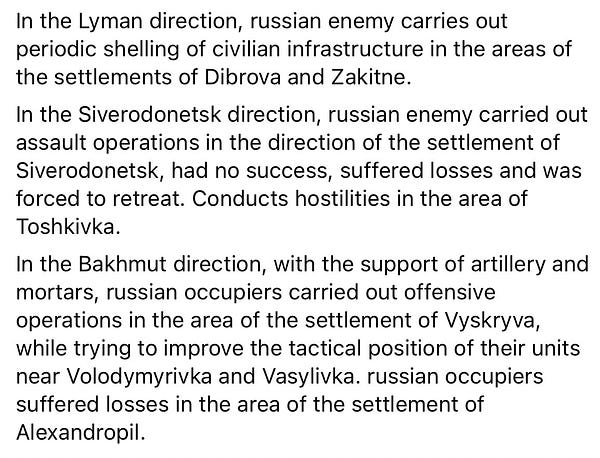
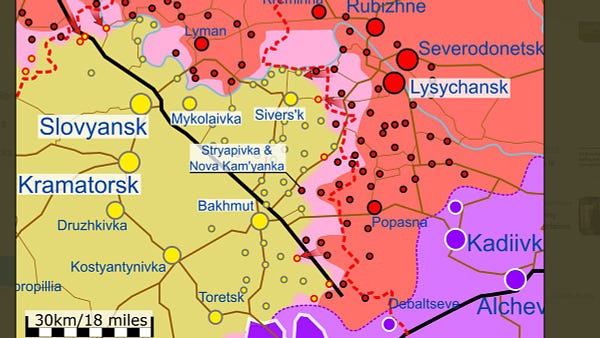

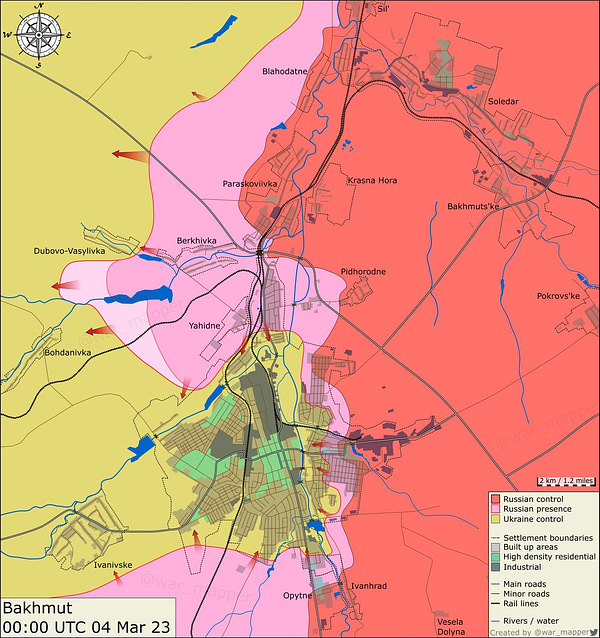


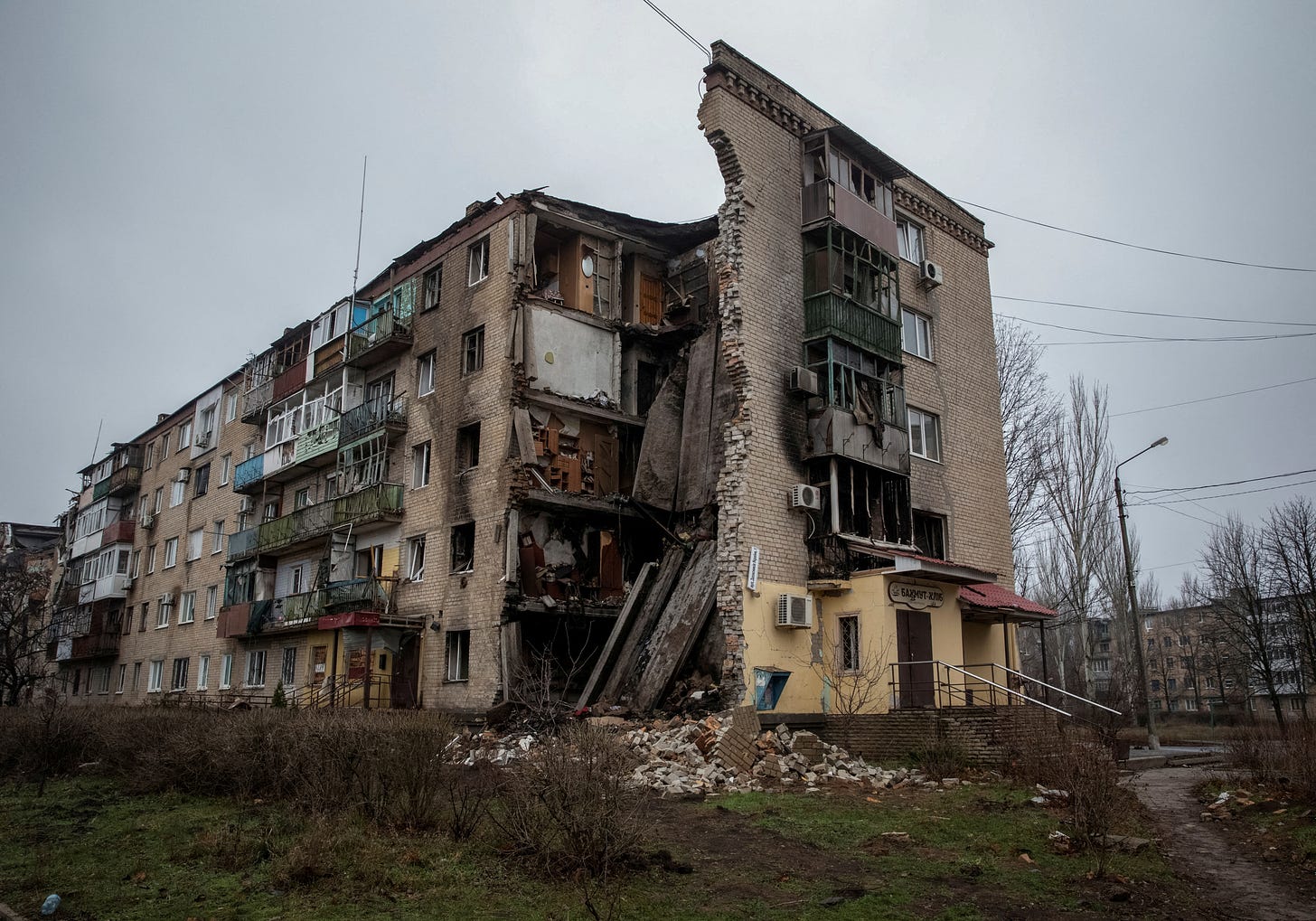
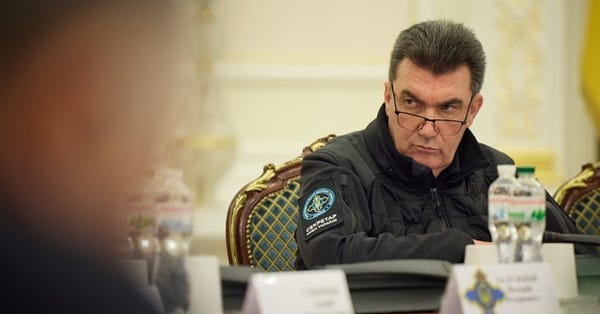

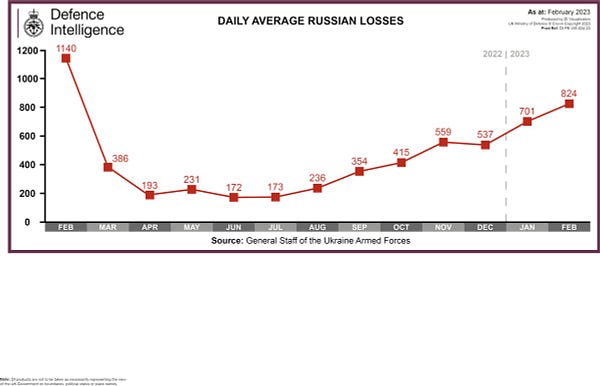

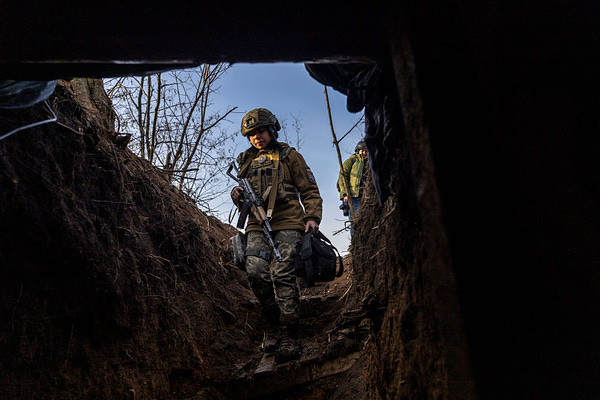


















0 comments:
Post a Comment